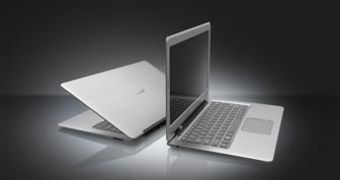Intel has been droning on and on about ultrabooks, but while those laptops are very well known, it is only due to the constant, aggressive advertising, not their popularity.
In fact, the super-thin laptops are still too expensive, although, true enough, the Santa Clara, California-based IT player has promised to fix that problem this year.
Nevertheless, any single company, even a huge CPU maker like Intel, can't carry a whole product category on its back alone.
In other words, PC makers have to agree to share the load and promote the ultrathins.
Much to Intel's chagrin, Acer has decided to cut back on its ultrabook plans for the ongoing year (2012).
That is to say, rather than striving to push ultrabook sales high enough for them to account for 25-30% of its total notebook shipments, the company reduced the goal to 12-20%.
Digitimes says that, due to this sudden strategy shift, Intel has begun to seek help from the upstream supply chain, whatever that means.
If we were to guess, Acer has a more pragmatic view of ultrabooks than Intel does.
While the latter has been doing its best to bring prices low enough ($700 / 527.94 Euro), the former, and other brand vendors (Toshiba, Samsung, ASUS) haven't been as eager to invest in them.
Rising labor costs in China and high production costs for all the custom-made components that Ultrabooks require didn't help matters.
All things considered, we are surprised Acer and its peers set such high goals in the first place. We understand that the device category is meant to preempt a tablet-caused decline of the whole notebook market, but one must keep in mind that these fears have been rather overblown as well.
At any rate, with the way things are going, Acer thinks that, if consumers do warm up to ultrabooks and seriously show interest, it will only happen one or two quarters later than Intel hopes.

 14 DAY TRIAL //
14 DAY TRIAL //